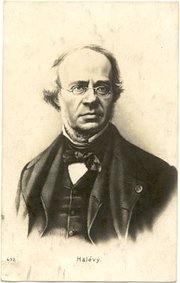|
|
Jacques Fromental Halévy (27 May 1799 - 17 March 1862) was a French composer. Though his contemporaries ranked him second to Meyerbeer in tragic subjects and second to Auber in comic ones, he had an easy success in the fiercely competitive musical world of Paris. He is known today largely for his opera La Juive.
Halévy was born in Paris, the son of a cantor, Elie Halfon Halevy, who was the secretary of the Jewish community of Paris, a writer and a teacher of Hebrew, and a French Jewish mother. He entered the Paris Conservatoire at the age of nine or ten (accounts differ), in 1809, becoming a pupil and later protegé of Cherubini. After two second-place attempts, he won the Prix de Rome in 1819: his cantata subject was Herminie.
On his return to Paris, the first commission that brought him to public attention was a Marche Funebre et De Profundis en Hebreu for three voices and orchestra, which was commissioned by the Consistoire Israélite du Département de la Seine, for a public service in memory of the assassinated duc de Berry, performed on March 24, 1820. later, his brother Léon recalled that the De Profundis, "infused with religious fervor, created a sensation, and attracted interest to the young laureate of the institute."
He was chorus master at the Théâtre Italien, while he struggled to get an opera performed. With the very modest success of L'artisan, at the Opéra-Comique in 1827, Halévy moved on to be chorus master at the Opéra. The same year he became professor of harmony and accompaniment at the Conservatoire, where he was professor of counterpoint and fugue in 1833 and of composition in 1840. He was elected to the Institut de France in 1836.
With La Juive, in 1835, Halévy attained not only his first major, international triumph, but gave the world a work that was to be one of the cornerstones of the French repertory for a century, during which time the role of Eléazar was one of the great favorites of tenors such as Enrico Caruso. The great aria is "Rachel, quand du Seigneur la grâce tutélaire:" its orchestral ritornello is the one quotation from Halévy that Berlioz included in his Treatise on Orchestration, for its first orchestral use of the valved French horn. La Juive was one of the grandest of grand operas, with a formal ballet, major choruses, a spectacular procession in Act I, and impressive celebrations in Act III. It culminated with the heroine's being thrown into a vat of boiling oil in Act V. Mahler admired it greatly, stating: "I am absolutely overwhelmed by this wonderful, majestic work. I regard it as one of the greatest operas ever created".
Halévy wrote some forty operas in all, including:
- L'Artisan
- Clari (1828), in Italian; a modest success, even with Maria Malibran
- La Dilettante d'Avignon (1828), again with Malibran
- Ludovic (1833), an opera that had been begun by Hérold, scoring a more solid success
- La Juive (1835), his first resounding, international success
- L'Éclair (1835), also a great success, in the same season
- Guido et Ginevra (1838), mediocre
- Le Shérif, which Hector Berlioz referred to as a "delightful comic opera"
- Le Guitarréro (1841), mediocre
- La Reine de Chypre
- Charles VI (1846)
- Les Mousquetaires de la reine (1846), a light costume romance
- Le Val d'Andorre, (1848), a huge success, according to Berlioz
- La fée aux roses
- La Tempesta (1850), in Italian, suggested by Shakespeare's The Tempest
- La Dame de pique (after Prosper Merimée)
- Le Juif errant (1852) after a play by Sue
- Jaguarita l'Indienne (1858)
- La Magicienne
- Nabab
Halévy also wrote for the ballet, provided incidental music for a French version of Aeschylus' Prometheus Enchained, and wrote cantatas.
He died in retirement at Nice, which had recently been added to French territory.
External links
- Hector Berlioz: relations with Halévy (http://www.hberlioz.com/Predecessors/halevy.htm)
- John Ericson, "The First Orchestral Use of the Valved Horn: La Juive" (http://www.public.asu.edu/~jqerics/La%20Juive.jpg)ja:ジャック・アレヴィ

